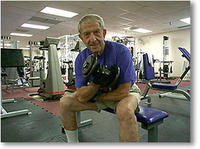
From the Associated Press
July 31, 2005
NEW YORK - Atkins nutritionist Inc., the company that promoted low-carb eating into a national diet craze, filed for bankruptcy court protection Sunday, a company spokesman said...
++++++++++++++++++++++++++++++
...and personal trainers, doctors and nutritionists finally let out a collective sigh of relief to see this rather embarrassing chapter of the never ending story from "The Latest Diet Craze Handbook" start to come to an end.
Granted, for a lot of people, this diet did technically work. In fact, I have friends and family members who used the plan to drop some unwanted weight (but most of them gained it all back). However, it was widely regarded from Day One as a medically unsafe regimen that could have serious, negative long-term effects on the body. In short, the diet caused the body to enter a catabolic state where it consumed its own tissue, including lean muscle, to make a number on a scale lower.
However, there are two sides to every story. Here are some positive and negative lessons that have been learned by millions of those who subscribed to the Atkins craze.
Positives
- Many learned to strictly track and log exactly what food they put into their body.
- Many accepted the fact that, in dieting, ingesting certain foods must be sacrificed or severely curtailed.
- Many found that they are ultimately in control of their own weight loss, and no one can do it for them.
Negatives
- Some may be looking for the next "trick" to make them lose weight instead of sticking to basic principles of healthy nutrition combined with regular exercise.
- Some may blame themselves for failing to keep the weight off instead of correctly blaming a faulty nutrition plan with unrealistic promises.
- Some may try to simply "modify" their plan by adopting another craze that is just a hybrid of the primary components of the Atkins philosophy ("Atkins Lite" type plans).
The reason that this craze is disappearing, along with the revenues of Atkins Nutritionals, is that it is an unrealistic and unhealthy approach to maintaining an ideal body weight. You could always easily spot a disciple of the Atkins approach, couldn't you? Their faces appeared gaunt. Their skin had an ashy, dull tone. Their muscle mass loss made them look like they were older than they actually were. Ten years ago, you would see someone like this who had lost a great deal of weight, and your first comment to them would be, "Wow, have you been sick?" But, in the last few years, it usually meant they had bought into the Atkins lifestyle. Skinny--but at what cost?
People who tried and failed at the Atkins Diet should adhere to the positive lessons mentioned above and apply them to a balanced nutrition and exercise plan than creates a caloric deficiency of 500-1000 calories per day. What they should do is avoid highly processed foods, excess sugar, alcoholic beverages and too many trips to their favorite restaurants. They should engage in daily exercise (both aerobic and resistance training), each natural foods without the trimmings and make healthy food decisions every day for the rest of their lives. You do not have to live a totally Spartan lifestyle, but you also cannot treat every meal as Thanksgiving.In jest, perhaps I should have latched on to this craze by offering an alternative plan that uses the same way of thinking to help people drop 15-20 pounds quickly. However, I do not think the Amputation Diet would have caught on as quickly, but you never know...
Have questions on how to do so? Email me your questions, and I will be glad to help as well as share with others on this blog!



